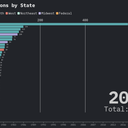
A new study by Professor Robert J. Smith of the DePaul University College of Law examines the imposition of death sentences by counties in the U.S. The author, who is also part of The Charles Hamilton Houston Institute for Race and Justice at Harvard, found that only a relatively few counties impose a large percentage of death sentences, while a large majority of jurisdictions have abandoned the use of capital punishment. Prof. Smith’s study found that death sentences that resulted in executions between 2004 – 2009 were handed down in less than 1% of counties in the United States. He noted in the abstract to the study, “There is nothing to suggest that the murders committed in those active death-sentencing counties are more heinous than murders committed in other counties. Nor is there evidence to suggest that the offenders in those counties are more incorrigible than those who commit crimes in other counties.” The skewed geography of the death penalty might lead to challenges to the constitutionality of the practice under the Eighth Amendment, which bars the arbitrary application of a punishment. The study, titled “The Georgraphy of the Death Penalty and its Ramifications,” will be published in a forthcoming edition of the Boston University Law Review.
(R. Smith, “The Geography of the Death Penalty and its Ramifications,” Aug. 22, 2011; Boston University Law Review, forthcoming; DPIC posted Oct. 19, 2011). See Arbitrariness and Sentencing. See also DPIC’s page on Executions by County.



